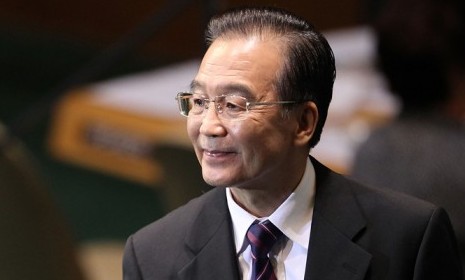Behind the China-Japan feud
It was ostensibly about a captured fishing-boat captain. But the conflict between the Asian economic giants went far beyond that

A free daily email with the biggest news stories of the day – and the best features from TheWeek.com
You are now subscribed
Your newsletter sign-up was successful
When Japan detained a Chinese fishing-boat captain on Sept. 8, accusing him of deliberately ramming two coast guard vessels near a set of disputed islands in the East China Sea, long-simmering tensions between the two economic powers quickly boiled to the surface. Harsh words between the two countries followed, and diplomatic relations hit their lowest point in five years. (Watch a report about the conflict.) Japan released the captain on Saturday morning, and China has since dialed down its rhetoric. But with land, gas deposits, and a historically fraught relationship in the mix, the situation remains tense. Here's a guide to the dispute so far:
What kicked off this latest flaring of tension?
The boat-ramming incident got it started. It happened near islands that both Japan and China claim sovereignty over — Japan calls them Senkaku, China, Diaoyu — and that are near important oil and natural gas fields. In a diplomatic breakthrough between the historic enemies, Japan and China in 2008 agreed to jointly develop the oil and gas deposits. China suspended those talks during the standoff.
The Week
Escape your echo chamber. Get the facts behind the news, plus analysis from multiple perspectives.

Sign up for The Week's Free Newsletters
From our morning news briefing to a weekly Good News Newsletter, get the best of The Week delivered directly to your inbox.
From our morning news briefing to a weekly Good News Newsletter, get the best of The Week delivered directly to your inbox.
So it is really about natural resources?
That is a big part of it, since fuel-hungry China and resource-poor Japan both covet an energy source so close to home. But some analysts think China is testing Japan's new government, led by the Democratic Party, which is viewed as more conciliatory than the hardline Liberal Democrats who have dominated Japan since World War II. China wants "to be a global naval power, and being able to do what they want in the East China Sea is an important part of that," says James Manicom at Canada's Balsillie School of International Affairs. "From the Japanese standpoint that is unacceptable."
What was the diplomatic fallout?
China launched a series of retaliatory measures, lodging a formal protest on Sept. 12 and cutting off most contact with the Japanese government. Beijing also stopped shipping vital rare-earth metals — key in manufacturing hybrid cars — to Japan, although it blamed a holiday for the interruption. Then, a week ago, Wen Jiabao, the usually reticent Chinese premier, weighed in with strong words, stating definitively that Japan "bears full responsibility for the situation, and it will bear all consequences."
A free daily email with the biggest news stories of the day – and the best features from TheWeek.com
What were some of the other consequences?
Anti-Japanese protests have sprung up around China; Japanese pop group SMAP called off a concert in Shanghai; China rescinded invitations to 1,000 Japanese youths to attend the Shanghai expo; and on Thursday, Chinese security officials detained four Japanese citizens they accused of illegally filming Chinese military installations. (Japan says it thinks the detention of the four Fujita employees is unrelated to the other standoff.) Things even got downright bizarre: A panda died in a Japanese zoo after being anesthetized so the zoo "could collect his sperm for use in artificial insemination." China cried foul and sent "a panel of experts to investigate."
Why did Japan decide to release the captain?
"In the end," says The Economist, "it came down to economic ties versus national pride," with the former winning out. China recently surpassed Japan as the world's second-biggest economy and is exerting its newfound leverage all over the world. Japan simply couldn't keep alienating such an important trading partner, and eventually it succumbed to "an avalanche of pressure" to let its prisoner go.
Who "won" the dispute?
While Japan "came off looking weak" by caving in, China's brash response ultimately hurt the country "by undermining confidence in China as a responsible stakeholder in the region." Ultimately, this was a message from China to other countries that "it is willing to go to extraordinary lengths to exert its maritime claims" — an unsettling message to receive from an emerging superpower that has advertised its own "peaceful rise."
Is this officially over?
For now, the worst appears to be in the past. But Japan still says it owns the islands in question and wants China to pay for repairing its coast guard vessels, while China still hasn't released the four men it accused of spying. So things may just be on hold until the next incident sends Sino-Japanese relations into another crisis.
Sources: BBC News, Guardian, AP, Bloomberg, Daily Yomiuri, Reuters, The New York Times